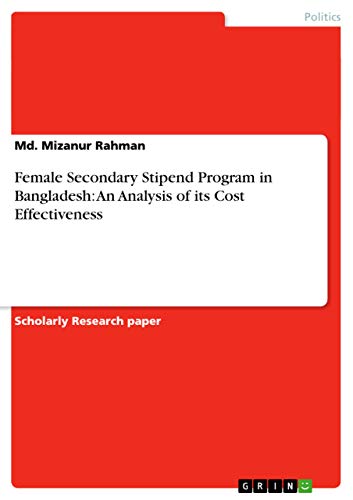Female Secondary Stipend Program in Bangladesh: An Analysis of its Cost Effectiveness - Softcover

"synopsis" may belong to another edition of this title.
"About this title" may belong to another edition of this title.
- PublisherGrin Verlag
- Publication date2013
- ISBN 10 3656394628
- ISBN 13 9783656394624
- BindingPaperback
- Number of pages52
Buy New
Learn more about this copy
Shipping:
US$ 24.61
From Germany to U.S.A.
Top Search Results from the AbeBooks Marketplace
Female Secondary Stipend Program in Bangladesh: An Analysis of its Cost Effectiveness
Book Description Taschenbuch. Condition: Neu. This item is printed on demand - it takes 3-4 days longer - Neuware -Research Paper (undergraduate) from the year 2013 in the subject Politics - Region: Other States, , language: English, abstract: Bangladesh as one of the South Asian countries has been striving to develop a comprehensiveeducation policy since its independence but failed to formulate such policy that could contribute to thedevelopment of the economy. The basic problem of primary and secondary level is poor enrolmentand low retention rate in the school. To combat with this problem government of Bangladesh has beenundertaking myriad policies and programs. Among such policies Female Secondary Stipend Program(FSSP), Food For Education Program (FFEP) and Free Text Book Distribution Program to thestudents of primary and secondary level are some innovative and better contributing policyinterventions in the field of female education in Bangladesh. All these policy interventions arepurported with the pivotal motto of reducing drop rate and increasing enrollment rate in the secondaryeducation. All these policies are currently in operation except the Food for Education Program whichhas transformed into a cash transfer program very recently. Based on the policy problem of reducingdropout rate of the secondary female students in the school, the above policies on FFEP, FTBDP andFSSP were chosen as three policy alternatives taking FSSP as status quo with a view to measuringefficacy of these policies employing the cost effectiveness analysis method apprising their relativeworth in reducing dropout of female students in the secondary level calculating the base year 1994 andanalyzing up to 2015 years data and thereafter to suggest the best policy option for the government ofBangladesh. Data were generated and gathered from the available literatures on the above-mentionedalternatives. Primarily FSSP populations were used as baseline population and compare it withdropout and enrolment rate achieved of all the relevant alternatives and based on the unit cost andretained student CEA of all the policy alternatives were calculated on excel sheets first and all datawere manually transformed into word format. The findings of the policy analysis unearthed the factthat in considering CEA of all the policy alternatives it was found that by using $1 it is possible toachieve a non-drop out sustained of 219 females in case of status quo (FSSP). In case of FTBDP byusing 1$ it will be possible to retain 970 female students. In relation to FFEP it will cost the same $1to achieve a non-drop out sustained of 14371 females enrolled. [.] 52 pp. Englisch. Seller Inventory # 9783656394624
Female Secondary Stipend Program in Bangladesh: An Analysis of its Cost Effectiveness
Book Description Taschenbuch. Condition: Neu. Druck auf Anfrage Neuware - Printed after ordering - Research Paper (undergraduate) from the year 2013 in the subject Politics - Region: Other States, , language: English, abstract: Bangladesh as one of the South Asian countries has been striving to develop a comprehensiveeducation policy since its independence but failed to formulate such policy that could contribute to thedevelopment of the economy. The basic problem of primary and secondary level is poor enrolmentand low retention rate in the school. To combat with this problem government of Bangladesh has beenundertaking myriad policies and programs. Among such policies Female Secondary Stipend Program(FSSP), Food For Education Program (FFEP) and Free Text Book Distribution Program to thestudents of primary and secondary level are some innovative and better contributing policyinterventions in the field of female education in Bangladesh. All these policy interventions arepurported with the pivotal motto of reducing drop rate and increasing enrollment rate in the secondaryeducation. All these policies are currently in operation except the Food for Education Program whichhas transformed into a cash transfer program very recently. Based on the policy problem of reducingdropout rate of the secondary female students in the school, the above policies on FFEP, FTBDP andFSSP were chosen as three policy alternatives taking FSSP as status quo with a view to measuringefficacy of these policies employing the cost effectiveness analysis method apprising their relativeworth in reducing dropout of female students in the secondary level calculating the base year 1994 andanalyzing up to 2015 years data and thereafter to suggest the best policy option for the government ofBangladesh. Data were generated and gathered from the available literatures on the above-mentionedalternatives. Primarily FSSP populations were used as baseline population and compare it withdropout and enrolment rate achieved of all the relevant alternatives and based on the unit cost andretained student CEA of all the policy alternatives were calculated on excel sheets first and all datawere manually transformed into word format. The findings of the policy analysis unearthed the factthat in considering CEA of all the policy alternatives it was found that by using $1 it is possible toachieve a non-drop out sustained of 219 females in case of status quo (FSSP). In case of FTBDP byusing 1$ it will be possible to retain 970 female students. In relation to FFEP it will cost the same $1to achieve a non-drop out sustained of 14371 females enrolled. [.]. Seller Inventory # 9783656394624

